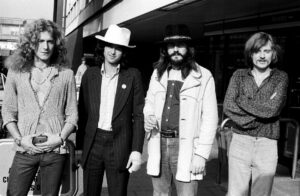The Birth of “Stairway to Heaven”
The genesis of “Stairway to Heaven,” one of the most iconic rock songs in history, can be traced back to 1970, following Led Zeppelin’s fifth tour across the United States. Exhausted and seeking solace from the relentless pace of fame, guitarist Jimmy Page and vocalist Robert Plant retreated to Bron-Yr-Aur, a rustic 18th-century cottage in the remote hills of Wales. With no electricity or running water, the cottage provided an ideal escape—quiet, unspoiled, and profoundly inspiring.
For Page, Bron-Yr-Aur became a sanctuary of creativity. “I always kept a cassette recorder nearby,” he would later recall, noting that much of his best music emerged in these simple, undistracted conditions. One night, during their stay, the first seeds of “Stairway to Heaven” began to sprout. A gentle fingerpicked melody in A minor emerged from Page’s guitar—meditative, mysterious, and timeless. This motif would become the foundation of the song’s introduction, its opening chords now instantly recognizable to generations of fans and guitarists alike.
Though the initial riff came together fairly quickly, the full composition took shape gradually, emerging from a patchwork of musical ideas Page had recorded over time. He treated the structure like a puzzle, weaving fragments together with meticulous care. The song’s dynamic progression—from a folk-inflected acoustic ballad to a full-blown hard rock crescendo—was deliberate and ambitious. “Stairway to Heaven” wasn’t just another song; it was a journey in sound, an ascending spiral of emotion and intensity.
The Lyrics and Mystique
While Page was composing the music, Robert Plant began working on the lyrics. Seated beside a roaring fireplace in Bron-Yr-Aur, he entered what he described as a sort of mystical trance. As the music played, words flowed from his pen almost as if channeled from some other place. “I just sat there and looked out the window,” Plant later explained, “and the lyrics just appeared.” The opening line—“There’s a lady who’s sure all that glitters is gold / And she’s buying a stairway to heaven”—set the tone for what would become one of rock’s most enigmatic and debated lyrical narratives.
The imagery is rich with allegory and metaphor. Themes of materialism, spiritual search, and self-realization swirl throughout the verses. The lyrics never quite resolve into a single, clear meaning, and therein lies their enduring allure. Was the lady in the song a symbol of greed, redemption, or illusion? Was the stairway literal or metaphorical? Plant himself has often downplayed efforts to decode the lyrics, preferring to leave their interpretation up to each listener’s imagination.
Studio Recording and Release
By late 1970, the band began rehearsing and refining the song during sessions at Headley Grange, a country house turned recording studio. This informal setting allowed them to work without pressure and experiment freely with arrangements. Page, ever the perfectionist, produced the track himself and layered guitar overdubs with precise artistry.
John Paul Jones contributed the haunting recorder intro, which added a Renaissance-like texture to the opening. Drummer John Bonham held off until halfway through the song, entering subtly before powering the final sections with his thunderous rhythm. Plant’s vocals rose steadily in passion and pitch, culminating in the soaring cry: “And as we wind on down the road…”—a climactic moment that cemented the song’s legendary status.
- “Stairway to Heaven” was released in November 1971 as part of the band’s untitled fourth album, often referred to as Led Zeppelin IV. Despite never being issued as a single, the song received massive airplay and quickly became the most requested track on FM radio in the United States throughout the 1970s.

Legacy and Cultural Impact
Over the decades, “Stairway to Heaven” has become far more than a song—it is a rite of passage for aspiring guitarists, a subject of myth and controversy, and a touchstone of rock’s golden age. Some praised its transcendent structure; others derided its perceived excess. But few could deny its impact.
Its legacy even entered legal arenas, with lawsuits alleging that its opening chords were plagiarized—a claim eventually dismissed in court. Still, the song’s mystique endures. Whether heard in a teenager’s basement, on a classic rock radio station, or live during one of Led Zeppelin’s historic performances, “Stairway to Heaven” continues to captivate.
Ultimately, it remains a monument to a particular moment in time—when four musicians, secluded in the Welsh countryside, followed inspiration up a winding path toward immortality.













